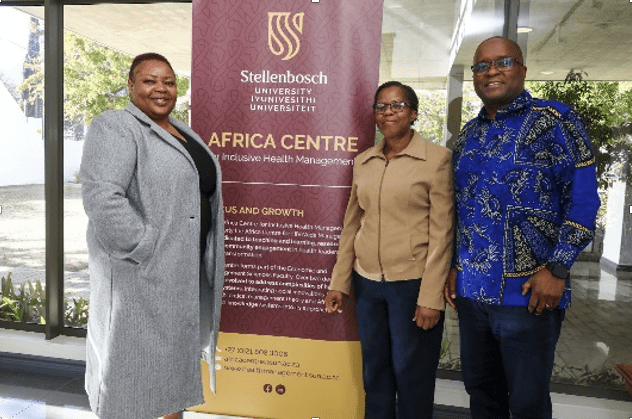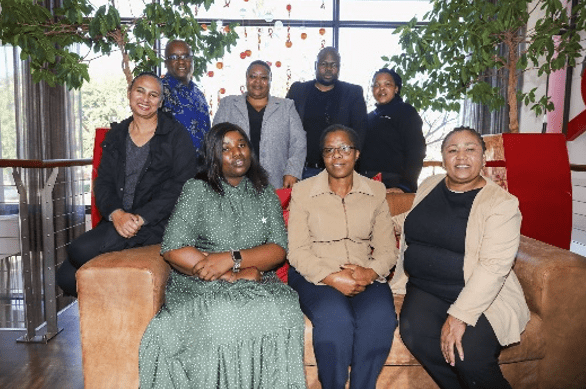

Drs Geldine Chironda and Esmina Mkwinda with the Africa Centre’s director, Dr Munya Saruchera.
The visitors from Malawi also had constructive interactions with the Africa Centre’s team – pictured here are Yolande Barendse, Dr Munya Saruchera, Dr Geldine Chironda, Fanyane Chabalala, Zimasa Kente, Rachel Mbuyamba, Dr Esmina Mkwinda and Mandy Jacobs.
At the end of May, the Africa Centre for Inclusive Health Management hosted delegates from Malawi’s St John of God University and Seed Global Health for a number of constructive workshops that potentially open up new avenues for collaboration.
The thinking caps were on for sessions that explored the joint development of a module on climate change and health and a postgraduate qualification in drug/substance addiction management and mental health that will also involve the SU Faculty of Medicine’s Department of Psychiatry. The group also had interactions with Africa centre staff and associates as well as the SU Department of Family & Emergency Medicine and the Department of Nursing and Midwifery, given that SJoGU has various academic programmes in nursing, midwifery, psychotherapy, counselling and clinical medicine.
In addition, they visited the SU library, met with students and staff of the Malawi Society and dropped in at the SU Division of Epidemiology & Biostatistics, the Business School and the School for Public Leadership. They alsobrainstormed around the Africa Centre-led One Health Collaborative Hub on rural-urban migration, land change and disease dynamics. Challenging, but exciting!
SJoGU (which recently transitioned to a university) is a valued partner of the Africa Centre, and in November 2024 the centre’s director, Dr Munya Saruchera, participated in their research dissemination conference. The visitors were Dr Esmina Mkwinda, SJoGU’s deputy vice-chancellor, and Dr Geldine Chironda, a Seed Global Health educator who works closely with SJoGU.
In the academic world, collaboration is of key importance. As Mkwinda said, “Collaboration will assist us as a young university to learn and improve on our operations, our academic support of faculty and student support. It creates opportunities of working together on joint programme development and offering, teaching and research supervision.”
Chironda agreed, saying “Academic collaboration, especially in Africa, are critical ─ now more than ever. It allows institutions to pool resources, share expertise and build capacity in ways that are contextually relevant and sustainable. Collaboration also helps challenge the traditional one-way flow of knowledge and instead promotes a more balanced, reciprocal exchange. In a continent as diverse and complex as Africa, working together enables us to address shared health and education challenges more effectively and to drive transformation that is both local and scalable.”
The sentiment was echoed by Saruchera, who said “Collaboration is the currency of multiband transdisciplinarity in an increasingly complex world ─ a new geopolitical order against unilateralism, as the world needs to craft a new development agenda and goals beyond the SDGs that will end in 2030. The coming together of different academic entity role players that have different competencies and advantages and operate in different contexts adds strength. Learning with and from one another is also an opportunity.”
Everyone had high expectations for the workshop week, centered around strengthening the collaborative framework between SJoGU, Seed Global Health and Stellenbosch University, especially through practical engagement and knowledge exchange. “We hoped to delve deeper into shared goals around mental health training, curriculum development and research,” Chironda said. “Additionally, we looked forward to mapping out concrete steps toward implementing co-teaching, faculty development and joint postgraduate programmes that reflect the evolving needs of mental healthcare in Malawi. I was most eager for the sessions focused on co-developing the climate change and health module, particularly as it intersects with mental health. This is an emerging area that we are passionate about incorporating into our curriculum at SJoGU, given the real impact of environmental stressors on community mental wellbeing.”
With the Africa Centre in particular, there are real value-adding links. “Inclusive health would expand our horizon in programmes we offer. The link with our mental health work will help us to be inclusive in our approaches, in capacity building of staff members and supporting students,” Mkwinda said. “This collaboration can open doors that will assist us to work together in areas that affect our universities, learn about the challenges that we all face and how these have been managed.”
Chironda added to this, saying “My role with Seed Global Health at SJoGU involves supporting mental health education and faculty development, which aligns closely with the Africa Centre’s focus on inclusive, context-driven health management and research. The centre’s experience with interdisciplinary teaching and planetary health offers us a model we can adapt to Malawi’s realities. In turn, SJoGU offers a unique environment where these approaches can be tested and refined in a low-resource setting, creating opportunities for impactful research, external teaching and co-supervision that mutually benefit both institutions.”
It was indeed a productive week with a lot of possibilities to explore further. As Saruchera said, “From our end the expectations were to deepen understanding and relationships between SJoGU, Seed Global Health and the Africa Centre, aligned to our mutual interests around building research, teaching and learning as well as community engagement. Malawi provides an opportunity for the Africa Centre and the broader Stellenbosch University to undertake work in a context vastly different from South Africa, effectively cutting new ground and engaging different and new challenges that will allow PhD, postdoc, research fellow and academic colleagues to undertake research that addresses Malawi’s needs. It can also provide opportunities for SU colleagues to be external faculty in working with SJoGU as it embarks on a new journey towards developing postgraduate qualifications.”
